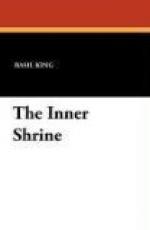“You mustn’t blame yourself,” the mother-in-law said, speaking with some difficulty, “for more than your own share of our troubles. I want to talk to you quite frankly, and tell you things you’ve never known. The beginning of the sorrows that have come to us dates very far back—back to a time before you were born.”
“Oh?”
Diane’s brown eyes, swimming in tears, opened wide in a sort of mournful curiosity.
“I admit,” Mrs. Eveleth continued, “that in the first hours of our—our bereavement I had some such thoughts about you as you’ve just expressed. It seemed to me that if you had lived differently, George might have been spared to us. It took reflection to show me that if you had lived differently, George himself wouldn’t have been satisfied. The life you led was the one he cared for—the one I taught him to care for. The origin of the wrong has to be traced back to me.”
“To you?” Diane uttered the words in increasing wonder. It was strange that a first role in the drama could be played by any one but herself.
“I’ve always thought it a little odd,” Mrs. Eveleth observed, after a brief pause, “that you’ve never been interested to hear about our family.”
“I didn’t know there was anything to tell,” Diane answered, innocently.
“I suppose there isn’t, from your European point of view; but, as we Americans see things, there’s a good deal that’s significant. Foreigners care so little about who or what we are, so long as we have money.”
Diane raised her hand in a gesture of deprecation, intimating that such was not her attitude of mind.
“And I’ve never wanted to bore you with what, after all, wasn’t necessary for you to hear. I shouldn’t do so now if it had not become important. There’s a great deal to settle and arrange.”
“I can understand that there must be business affairs,” Diane murmured, for the sake of saying something.
“Exactly; and in order to make them clear to you, I must take you a little further back into our history than you’ve ever gone before. I want you to see how much more responsible I am than you for our calamity. You were born into this life of Paris, while I came into it of my own accord. You did nothing but yield naturally to the influences around you, while I accepted them after having been fully warned. If you knew a little more of our American ideals I should find it easier to explain.”
“I should like to hear about them,” Diane said, sympathetically. The new interest was beginning to take her out of herself.
“My husband and I,” Mrs. Eveleth went on again, “belong to that New York element which dates back to the time when the city was New Amsterdam, and the State, the New Netherlands. To you that means nothing, but in America it tells much. I was Naomi de Ruyter; my husband, on his mother’s side, was a Van Tromp.”
“Really?” Diane murmured, feeling that Mrs. Eveleth’s tone of pride required a response. “I know there’s a Mr. van Tromp here—the American banker.”




